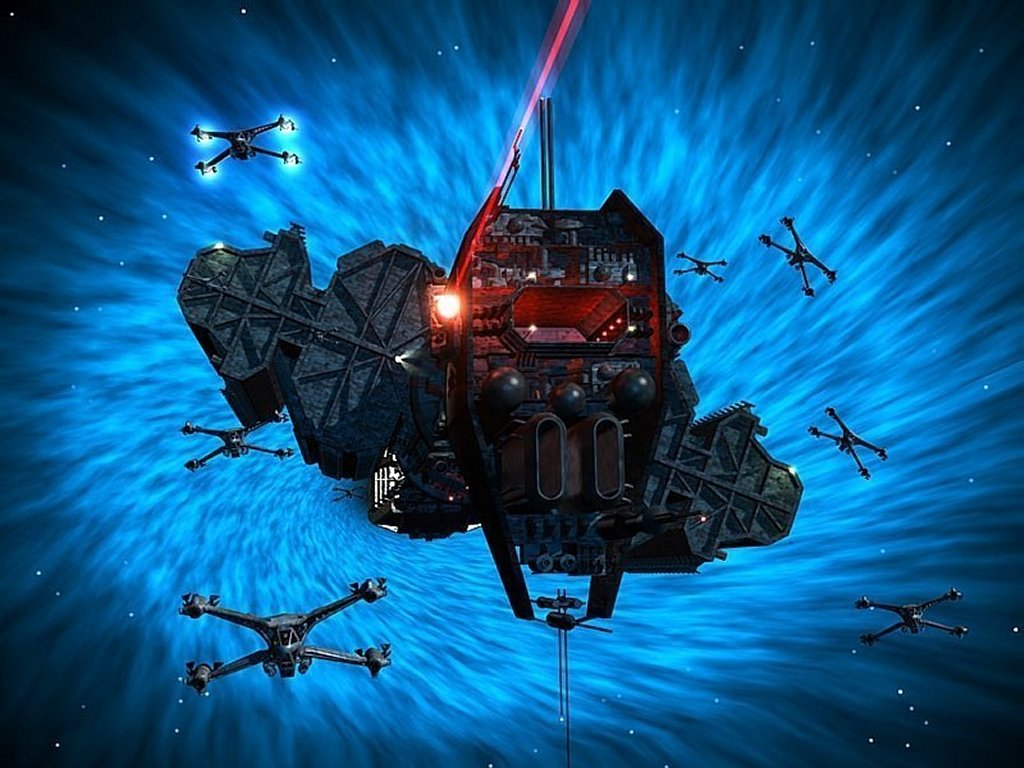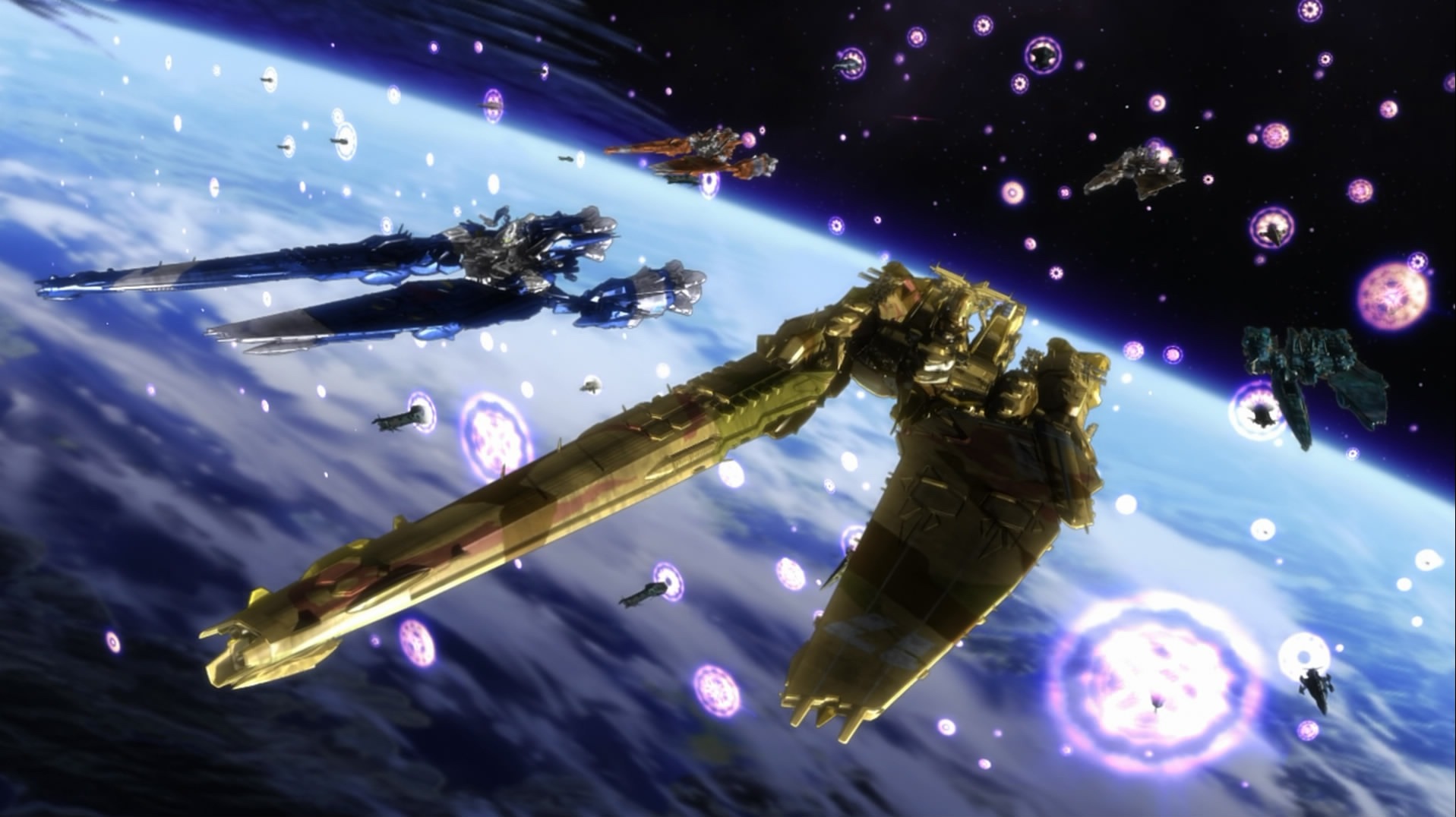 Occasionally the idea of a “superversive canon” comes up in our discussions. We’re flexible enough in our terms (good storytelling, heroic characters, and a sense of wonder) that people can have varying ideas of what is and isn’t superversive. My wife, a woman who is supremely kind and beautiful but a muggle, doesn’t really see anything with a lot of tension as uplifting. She’s an outlier, but the fact remains: what I find to be soul-restoring (huge explosions and improbably large space fleets) she finds to be stressful. I’ve got several very good friends who look at huge explosions and improbably large space fleets and give them a shrug of the shoulders and a disdainful “meh,” as it’s infrequent to find elves and dwarves involved in such things. (Frikkin’ fantasy folks.) Sense of wonder’s probably supremely negotiable except perhaps in the hands of a very skilled writer.
Occasionally the idea of a “superversive canon” comes up in our discussions. We’re flexible enough in our terms (good storytelling, heroic characters, and a sense of wonder) that people can have varying ideas of what is and isn’t superversive. My wife, a woman who is supremely kind and beautiful but a muggle, doesn’t really see anything with a lot of tension as uplifting. She’s an outlier, but the fact remains: what I find to be soul-restoring (huge explosions and improbably large space fleets) she finds to be stressful. I’ve got several very good friends who look at huge explosions and improbably large space fleets and give them a shrug of the shoulders and a disdainful “meh,” as it’s infrequent to find elves and dwarves involved in such things. (Frikkin’ fantasy folks.) Sense of wonder’s probably supremely negotiable except perhaps in the hands of a very skilled writer.
The other problem with the idea of a superversive canon is the question of “Where do we start?” Superversion didn’t need to exist once upon a time, before the literary world’s petty-mindedness hadn’t crept into the land of skiffy. So I kind of feel like it’s hard to look at a work and say “It’s superversive” when maybe it was just more representative of a culture that actually produced people who could do things like fight to stop pure evil from conquering our planet. So maybe, the issue is just what stories formed us in the superversive mold.
 CS Lewis is an obvious choice; Madeline L’Engle probably no less so. But y’know, if I had to pick one work that formed a pattern I wanted to follow in my own superversive writing, a place to start my canon, it would probably E.E. “Doc” Smith’s Lensmen books. It’s probably an odd thing for a guy known for writing mostly introspective, character driven stories to say, but there you have it. Doc Smith is the start of my canon; and if I’ve found one weakness as I’ve been working on my own novel, Do Buddhas Dream of Enlightened Sheep, it’s that I’m a Flannery O’Connor who really wants to be a Doc Smith. But really, the Lensmen saga has almost everything that I want in a book: heroism,
CS Lewis is an obvious choice; Madeline L’Engle probably no less so. But y’know, if I had to pick one work that formed a pattern I wanted to follow in my own superversive writing, a place to start my canon, it would probably E.E. “Doc” Smith’s Lensmen books. It’s probably an odd thing for a guy known for writing mostly introspective, character driven stories to say, but there you have it. Doc Smith is the start of my canon; and if I’ve found one weakness as I’ve been working on my own novel, Do Buddhas Dream of Enlightened Sheep, it’s that I’m a Flannery O’Connor who really wants to be a Doc Smith. But really, the Lensmen saga has almost everything that I want in a book: heroism, giant explosions and weaponized solar systems, sense of wonder, and enough manliness that Gurren Lagann‘s Kamina would approve of its burning soul. Deeper characterization might not have been amiss, but too often such things turn into unending navel gazing.
After the Lensmen, things get fuzzier. And it’s odd. I think Scifi’s descent into the morass of distasteful modern thinking really started with Robert Heinlein. I loved his books so much as a kid, and eventually I found my way from his juveniles to his “adult” works without ever realizing that there were two different sorts of writing that came out of Heinlein. Stranger in a Strange Land was so distasteful to me that it was one of the last Heinlein novels I ever read– I think the only one I’ve read since then was The Moon is a Harsh Mistress, and that was a good ten years ago.
But my superversive canon definitely includes some choices some might find questionable: The Hyperion Cantos, for one. I feel like Hyperion and its sequels become something like what a character driven Lensmen might have been. And Neuromancer: It’s not exactly wallowing in heroism, but it’s still a fantastic work that I cheerfully count amongst my inspirations.
Y’know, when it comes down to it, some things are all very individual and hard to quantify: A woman’s beauty, bacon’s appropriate crispiness, a workable theodicy, and the works that inspire us to do objectively great things. The canon might be doomed to remain highly individual.
So I ask you, readers: What’s your canon?
Josh Young is a seminary student, Castalia House author (featured in God, Robot and author of the forthcoming Do Buddhas Dream of Enlightened Sheep) and blogger at Superversivesf.com If you enjoyed this, we’d love to have you visit our main site!
Interesting question…
‘Fire Upon the Deep’ by Vernor Vinge.
‘Wolftime’ and ‘Erling’s Year’ by Lars Walker.
‘The Lion, the Witch, and the Wardrobe’ by C.S. Lewis.
‘Deed of Paksennarrion’ by Elizabeth Moon.
Lol, that was aptly put. And I’m exactly like your wife, but in my (our?) defense, I’m not sure it’s biologically sensible for women to get massive spikes of testosterone inducing adrenaline.
That said, I WISH my canon was this:
a) Chronicles of Narnia
b) LOTR
c) Dune
(all books I enjoyed and respected)
But truthfully it’s this:
a) Anne of Green Gables
b) Harry Potter
c) Ender’s game/Ender’s Shadow
“Chronicles of Narnia”
“A Wrinkle in Time”
“Lord of the Rings”
Lawhead – his “Pendragon Cycle” and his King Raven Trilogy
I really need to write about Lawhead soon – I keep forgetting. There’s a man who should be our poster boy and who way few of us have even heard of.
By the way, spotted a typo:
I’ve found one weakness as I’ve been working on my own novel, Do Buddhas Dream of Enlightened Sheep, it’s that I’m a Flannery O’Connor who really wants to be a Doc Smith.
You misspelled “TOTALLY AWESOME QUALITY” as “weakness”.
Gulliver’s Travels
everything by Phillip K Dick
just about everything by P.G. Wodehouse
Those are all works that make me happy, enlightened, etc. That is, they’re uplifting to my soul. In any case, I used to be a “Flannery O’Connor.” I refuse to be any longer.
I’d like to contribute, but I’m a little fuzzy on what “superversive” actually means. Is it “good storytelling, heroic characters, and a sense of wonder”? And I do take your point, Mr. Young, that prior to thus-and-such a date, superversion did not truly exist in its present role. As for which stories help form the superversive mind:
Tom Jones (1749) – Henry Fielding’s rousing good comic adventure yarn about how, so often in life, appearing to do good may count for more than actually doing good. Fear not, dear reader, Fielding does not wallow in the unfairness of fortune, and the author makes sure that the genuine good intentions of the flawed but still heroic Tom overcome the selfish deceptions of his foster brother, Blifil.
The Count of Monte Cristo (1844) – The often unacknowledged predecessor to many of today’s revenge-obsessed super heroes, sans their four-color, spandex-covered silliness. Alexandre Dumas lets his hero benefit from a certain serendipity, but he attempts to keep the heroic Count’s quest for justice within the realm of the plausible.
Master and Commander (1969) – Patrick O’Brian’s heroic duo Jack Aubrey and Stephen Maturin, the ship’s captain and surgeon, respectively, of the H.M.S. Sophie, was slow to catch on with the public, until it was reissued by a clever publisher in 1990. Followed by numerous sequels until O’Brian’s death in 2000, fans came to treasure the author’s combination of naval heroics in Britain’s wars with Napoleon, deeply researched details of naval life during that period, and well-realized characterizations of works’ protagonists. I cannot say that all of the sequels were equally good, but if one enjoys this first book, then I urge the reader to follow up with at least the first two sequels, Post Captain (1972), and H.M.S. Surprise (1973.)
Watership Down (1972) – a.k.a. “that rabbit book” – Richard Adams’s tale of rabbits escaping a doomed warren tackles epic themes, and even echoes the Odyssey of Homer a time or two. Adams humanizes his four-footed heroes here and there, but their world and their mythology remain those of the wild rabbit, always alert for dangers from their predators, be they human or animal.
If you’re looking for a sense of wonder, I’d recommend almost anything by Ray Bradbury. Sure, Fahrenheit 451 (1953) was a downer, and has probably frightened as many thoughtful readers as Orwell’s 1984 ever did, but one can always give the more upbeat Dandelion Wine (1957) a try. If you like short story collections, The Illustrated Man (1951) contains some of Bradbury’s best early work, as does his collection of linked tales, which is sometimes called a novel, The Martian Chronicles (1950.)
I cannot help but want to endorse several works already mentioned in this thread: Dune, The Lord of the Rings, and L’Engle’s “Time Quintet.” And P.G. Wodehouse is usually good for a laugh.